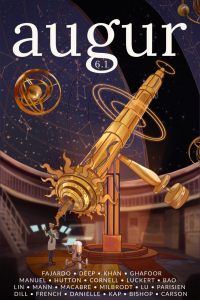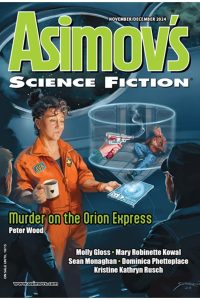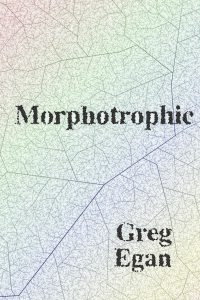A.C. Wise Reviews Short Fiction: Augur and khōréō
Augur issue 6.1 is packed with a mix of fiction and poetry and includes Bailey Macabre‘s “âniskac”, a comic which features lovely art and is set in a world recovering from environmental collapse looking back on the follies and failures of the past. Several of the stories and poems in the issue reflect on similar themes of climate change, regret over the past, and hope for a better future, including “The Collective Memories of Dogs and Robots” by P.A. Cornell, a brief and bittersweet story about a dog and a robot encountering each other in a posthuman world, sharing their recollections of humanity. One of the lighter stories in the issue, taking a more humorous tone in its look at the past while still having an underlying serious message, is “Pushing Up Roses” by Kelsey Hutton, in which a widow contemplates her marriage on the one-year anniversary of her husband’s death. She finds her house suddenly overrun with roses, to the point where they cover the windows and doors and trap her inside. She quickly realizes this is one last “romantic” gesture from her husband, and confronts his ghost, demanding he stop. She never wanted the showiness of bouquets of flowers; all she wanted was for her husband to help around the house, and for their marriage to be a true partnership, rather than a relationship dressed up in the trappings of romance with no real substance behind it.
The two standout stories in the issue, though, were “The Zones of Heaven and Earth” by Saad Omar Khan and “For This Time Only” by Ryanne Kap. The first provides a lovely meditation on faith, specifically what it means to live as a Muslim in the age of space travel, and reconcile the various writings, teachings, and beliefs of that faith with the reality of living amongst the stars. Faith is a subject that often gets neglected in science fiction. It is either left out of narratives, implying that humanity has moved beyond the need for religion; has been replaced by faith in science; or when faith is shown, it’s the rituals and a system of belief practiced by an alien culture (as frequently happens in Star Trek); or it has been transported forward wholesale without showing any signs that practices have adapted over time. It’s refreshing to see a story that asks questions and considers the ways faith might evolve alongside a new understanding of humanity’s place in the universe, and the challenges and possibilities that evolution may present. Kap’s story focuses on a single woman amidst a group of couples, traveling to China to adopt a child. She stands out both for her race, and for her marital status, leading to some insecurity. The story takes a light touch with the speculative element at first, slowly building to the reveal that the children being adopted are in fact ghosts, or the idea of children who never got the chance to live due to the one-child policy. It’s beautifully written, with striking imagery, exploring loneliness and belonging, what it means to have a place in the world.
khōréō issue 3.1 offers up a group of short stories which carry a common thread of melancholy, reflecting on loss, longing, and grief, but also offering a note of hope. The stories also share a lyrical nature, filled with gorgeous prose and lovely imagery. “For However Long” by Thomas Ha paints a heartbreaking picture of a mother considering her relationship with both her son and her own mother, looking back on the way her relationship with her mother changed when she moved across the country, and comparing it to her relationship with her son who currently lives off-world. The pull between staying connected to your roots and honoring your past, while forging your own path and living your own life is palpable, and Ha does an excellent job of showing both sides of the equation.
“In April, the Dead” by Natalia Theodoridou is set in a town where every April the dead emerge from the sea to spend time with their loved ones who are still among the living, all except for the protagonist’s father. The protagonist’s mother curses and blames the sky, while the protagonist continue to watch the waves with hope. The story is striking and effective on its own, and can also be read as a metaphor for different ways of processing grief and loss. “In the Land of Happiness” by Laura Wang reflects on language, belonging, and the need to find one’s own path to happiness. A traveler comes to the Land of Happiness, but struggles to understand the language, feeling like a perpetual outsider, missing the nuances, connections, and sense of belonging that everyone else seems to feel. Gradually, they find a way forward that works for them and begin to see the possibilities of what their own happiness might look like. This is another story that is satisfying on its own, but can also be read as a metaphor for the experience of immigration and the pressure to assimilate, or even the experience of being an outsider to a group and feeling the need to bend yourself to fit in, rather than following your own path. Overall, this was a very strong issue; all the stories are worth reading, and many feel like they are in conversation with each other, making reading them together even more satisfying.
Recommended Stories
“The Zones of Heaven and Earth”, Saad Omar Khan (Augur 6.1)
“For This Time Only”, Ryanne Kap (Augur 6.1)
“For However Long”, Thomas Ha (khōréō 3.1)
“In the Land of Happiness”, Laura Wang (khōréō 3.1)
A.C. Wise is the author of the novels Wendy, Darling, and Hooked, along with the recent short story collection, The Ghost Sequences. Her work has won the Sunburst Award for Excellence in Canadian Literature of the Fantastic, and has been a finalist for the Nebula Awards, Stoker, World Fantasy, Locus, British Fantasy, Aurora, Lambda, and Ignyte Awards. In addition to her fiction, she contributes a review column to Apex Magazine.
This review and more like it in the October 2023 issue of Locus.
 While you are here, please take a moment to support Locus with a one-time or recurring donation. We rely on reader donations to keep the magazine and site going, and would like to keep the site paywall free, but WE NEED YOUR FINANCIAL SUPPORT to continue quality coverage of the science fiction and fantasy field.
While you are here, please take a moment to support Locus with a one-time or recurring donation. We rely on reader donations to keep the magazine and site going, and would like to keep the site paywall free, but WE NEED YOUR FINANCIAL SUPPORT to continue quality coverage of the science fiction and fantasy field.
©Locus Magazine. Copyrighted material may not be republished without permission of LSFF.







